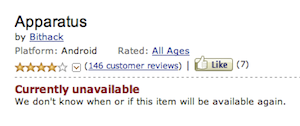Internet retailer Amazon launched its own Android software distribution channel earlier this year—but recent complaints by a prominent third-party developer suggest that Amazon's offering isn't entirely living up to its promise.
Amazon's service, which is called the Amazon Appstore, competes with Google's Android Market. Issues with the Android Market made the availability of a third-party storefront seem very appealing, and the Amazon Appstore promised a better-curated ecosystem while offering hardware vendors a chance to gain more independence from Google.
But the Amazon Appstore has its own issues. Independent Swedish game development house Bithack has pulled its moderately popular game Apparatus from the Amazon Appstore. A statement published on Bithack's website highlights some of the problems with the Amazon Appstore from a developer's perspective.
Key differences
Google's Android Market is very loosely policed. The barrier to entry is fairly low and software submitted by third-party developers isn't subjected to close scrutiny before it is made available for public consumption. This approach has obvious advantages for developers because it takes much of the uncertainty and anxiety out of the publication process. The downside, however, is that users have to take more responsibility for protecting themselves from malicious software—a problem that is attracting a growing amount of attention in the Android ecosystem.

One thing that differentiates the Amazon Appstore from the Android Market is that Amazon has elected to take a more Apple-like approach to evaluating submitted software. Amazon analyzes applications before they are published and makes a proactive effort to block software that could pose potential security risks.
Unsurprisingly, Amazon's Appstore approval process has many of the same pitfalls as Apple's. The duration between submission and publication is unpredictable, and some of the policies that govern whether an application is rejected are ambiguous. Bithack says that Apparatus was initially declined two weeks after submission due to the lack of SSL encryption for the game's networked functionality, which mainly consists of the ability to submit and download custom levels—not exactly a sensitive operation. Updates are subjected to the same lengthy review process, which means that the availability of bugfixes for end users often face delays.
Making useful software easier to discover is a big challenge for mobile application stores. Many users turn to resources like AppBrain or AppShopper to get a clearer view of what applications are currently popular or on sale. Amazon, one of the defining companies in the Internet retail sector, is well-equipped to deliver a superior shopping experience with similar kinds of advanced tools.
Indeed, the Amazon Appstore is organized better than the Android Market, has better search tools, and does a better job of highlighting good applications and developers. It also has some great features like the "Deals" section. Unfortunately, a lot of the great functionality from the Amazon website isn't available in the mobile application.
The problem that Bithack encountered was the lack of visibility for new software; it's hard for an application to climb high enough in popularity to land in the most prominent sections of the store if nobody even knows it exists.
One of the best tools I've found for discovering interesting new Android applications is the combination of AppBrain's "Hot this Week" section and the "new" filter. The "How New Releases" section in the Amazon Appstore isn't comparable and doesn't do a good job of pushing genuinely new stuff to the top. Apparatus did, however, eventually reach that section of Amazon, which indicates that the visibility issues aren't insurmountable for new software.

Amazon's Free Application of the Day (FAD) and discounted application promotions are probably the biggest driver of Amazon Appstore adoption among regular end users. The FAD apps are often useful enough by themselves to get Android users to install Amazon's store. The promotional deals are considered good publicity for developers, but that isn't always the case.
Bithack says that the average rating for Apparatus declined sharply on Amazon after the game was promoted as a FAD offering. The reason is that the application's 3D graphics and physics engine didn't work with some old, small, or low-end Android handsets.
Unlike the Android Market, the Amazon Appstore doesn't try to filter out applications that are incompatible with the user's device. Users who simply couldn't run Apparatus—and consequently shouldn't have seen it offered in the Amazon Appstore application—installed it anyway and slammed it with negative feedback when it didn't work on their phones. The unwarranted negative reviews and the lack of a mechanism to respond played a major role in Bithack's decision to leave the Appstore behind.
This lack of device filtering is a double-edged sword. Although it clearly creates major issues for regular end users, it's highly valued by Android enthusiasts because the Android Market tends to be very conservative about what applications it will show. In some cases, particularly on modded devices, it hides a lot of software that happens to work fine.
I use the Amazon Appstore on a hacked Nook Color, for example, because it lets me install a bunch of useful applications that don't show up in the Android Market on the same device. Of course, I would also never leave a negative review in the Appstore if an application failed to work as expected when run on completely unsupported hardware.
Perhaps the best approach to this issue is a middle ground solution. Amazon should respect the compatibility constraints defined by the application developer in the manifest file by default, but provide an option somewhere that will allow advanced users to override the restrictions.

Transitional challenges
Bithack's departure from the Amazon Appstore raises some tough questions about the logistical challenges in leaving a store behind. Users purchase software from an application store with the expectation that they will continue receiving updates and be supported going forward. Without that expectation, they might be reluctant to buy software at all.
Bithack is encouraging its Amazon Appstore customers to buy Apparatus again from the Android Market—with a promise that the cost of the purchase will be refunded to users who show a receipt indicating that they already bought it from the Amazon Appstore. This offer will not be extended to users who received Apparatus for free during the FAD promotion.
The effort of handling all of those refunds could be significant, and this is obviously not a solution that would scale well to more popular applications with a longer presence in the Amazon Appstore. In a way, the commitment to supply updates and the difficulty of transitioning paying customers to another distribution channel create a form of lock-in for developers, who need to think carefully before joining a new distribution channel.
Amazon's Appstore has a lot to offer end users and hardware vendors, but challenges that it poses for third-party Android application developers are worth keeping in mind.
reader comments
70